 Petzlover
Petzlover Domestic Shorthaired Cat is originated from United States but German Rex is originated from Germany. Both Domestic Shorthaired Cat and German Rex are of same weight. Domestic Shorthaired Cat may live 3 years more than German Rex. Both Domestic Shorthaired Cat and German Rex has same litter size. Both Domestic Shorthaired Cat and German Rex requires Low Maintenance.
Domestic Shorthaired Cat is originated from United States but German Rex is originated from Germany. Both Domestic Shorthaired Cat and German Rex are of same weight. Domestic Shorthaired Cat may live 3 years more than German Rex. Both Domestic Shorthaired Cat and German Rex has same litter size. Both Domestic Shorthaired Cat and German Rex requires Low Maintenance.
 The Domestic short-haired cat has also got mixed ancestry and can have lots of different looks. In the UK they are often referred to as Moggie.
The Domestic short-haired cat has also got mixed ancestry and can have lots of different looks. In the UK they are often referred to as Moggie.
It is one of the most common cats in the United States. The roots of this cat go back to the pioneer settlement in North America where they were thought of as working cats. Nobody seems clear on where they originated from.
Hardy and unaffected, they quickly became a sought after cat that stood up well to all kinds of conditions. Even though this cat is a non-pedigreed cat, it is accepted by the Cat Fanciers' Association (CFA) in the Household Pets category.
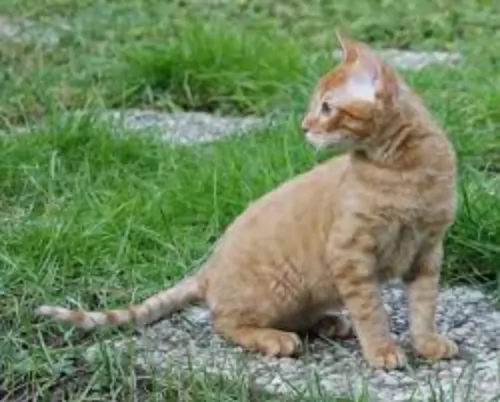 The cat originates from Germany and was developed in about the 1950s. Dr. Rose Scheuer-Karpin found a frizzy-haired black and white cat and chose to breed her.
The cat originates from Germany and was developed in about the 1950s. Dr. Rose Scheuer-Karpin found a frizzy-haired black and white cat and chose to breed her.
So as to fix the frizzy hair gene, it was decided to mate the cat further and this was the start of the German Rex.
It was later crossed with the Cornish Rex. The cats were recognized by the International Feline Foundation, but the Cat Fanciers' Association still associates the breed with the Cornish Rex.
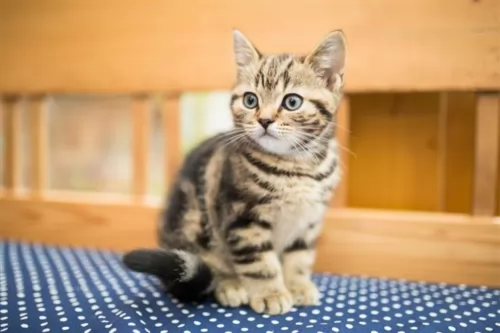 The Domestic short-haired cats can be so many things – different coat colors and different patterns as well as being different shapes and sizes.
The Domestic short-haired cats can be so many things – different coat colors and different patterns as well as being different shapes and sizes.
They can all have different shaped eyes and colors and their ears and tails can differ from cat to cat. The reason for this is that these cats don’t belong to a specific breed.
It has a mixed ancestral history. The Domestic Shorthaired varies in colors and size and their coats can be any color, solid or patterned. The length of the coat is short and is silky and shiny.
It’s a low shedding cat and grooming will be easy. Every cat has its own physical characteristics, and some can have a slight build while others are heavier built and more muscular.
You could find their eyes can be different colors too – blue, green, copper or brown.
Just like the Domestic Shorthair has lots of different looks, the temperament too varies. There is no set standard for these cats and when you choose a kitten, you can’t really be sure how they will turn out.
Your cat may be quiet, very vocal, active, placid, loyal loving, independent, playful or lazy – who knows with these wonderful cats?
Certainly, most of them are friendly, loving and loyal. They make wonderful pets for new cat owners, singles, couples, families and seniors.
People love them as they aren’t high maintenance pets – they are undemanding.
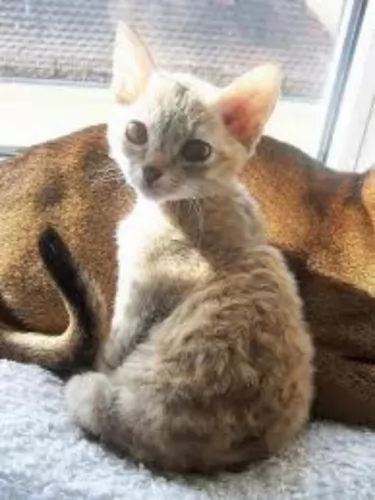 This is a medium-sized, muscular domestic cat with a well-developed chest. The cat can weigh between 3 and 6kg.
This is a medium-sized, muscular domestic cat with a well-developed chest. The cat can weigh between 3 and 6kg.
The legs are fairly long and slender but strong and the tail is thick and furry with a rounded tip. The head is round and the ears are large. The eye colors are always related to the coat color. The coat is short and silky and in many colors and it has a tendency to curl.
These are friendly cats that form a strong bond with their human owners, although they are friendly towards strangers too.
They’re intelligent, lively, and playful too and will fit in well to homes with children.
Because of their playful nature, you want to ensure you provide them with lots of entertaining, stimulating toys.
They’ve got balanced personalities and are known for being sociable, adapting to the lifestyles they find themselves in. They will also get on well with other pets in the home, and enjoy being both indoors and outside.
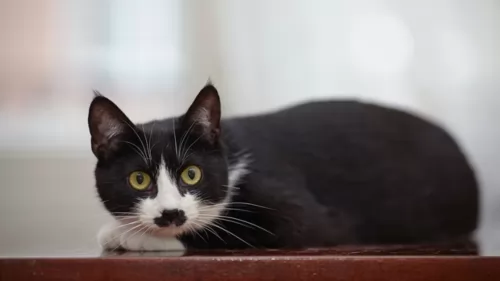 As we’ve already suggested, the Domestic Shorthaired has an easy-going personality, not demanding much from you except nutritious food and lots of love and attention.
As we’ve already suggested, the Domestic Shorthaired has an easy-going personality, not demanding much from you except nutritious food and lots of love and attention.
It’s important to provide your cat with a lifestyle that keeps him happy and content.
Rather than buy your pets lots of expensive cat accessories, your cat will be happier to do with less but to have more attention from you. This cat is willing to give you so much love and companionship ad he asks the same from you.
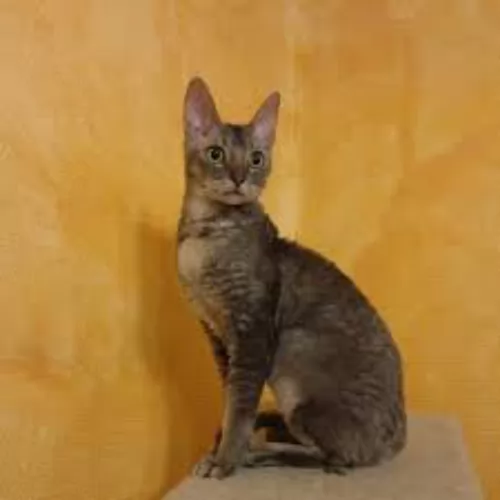 Your German Rex is everything you want in a pet. He is a cat that loves his human family and is prepared to offer loyalty and love in exchange for the same.
Your German Rex is everything you want in a pet. He is a cat that loves his human family and is prepared to offer loyalty and love in exchange for the same.
He is adaptable and undemanding. Before you invest in such a cat, understand that interaction from you is highly important, so if you don’t have time for an adult pet, it would be kinder not to get this particular cat breed as they crave lots of attention,
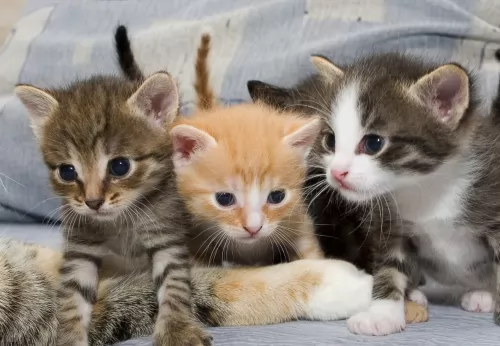 Because of their mixed breed, these Domestic Shorthaired cats don’t sicken easily and they are healthy cats and robust – less vulnerable to the genetic problems that plague purebred cats.
Because of their mixed breed, these Domestic Shorthaired cats don’t sicken easily and they are healthy cats and robust – less vulnerable to the genetic problems that plague purebred cats.
Nonetheless, he can succumb to illness and then you need to get him to the vet immediately. There are come cat illnesses that can kill your cat in just a few hours. Look at bloat as an example – this is when your cat’s stomach becomes swollen and your pet is weak and vomiting. It’s a life-threatening condition that can kill your cat in half an hour,
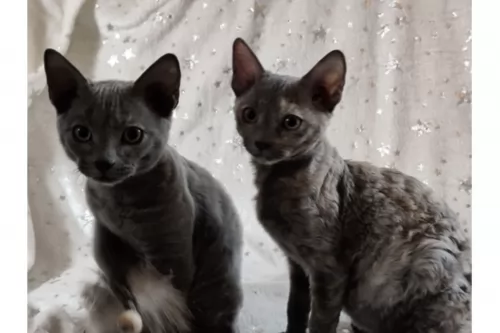 With excellent care and lots of love and attention, your German Rex can reach up to 17 years of age. They aren’t prone to any particular diseases, but diet plays a massive role in their health.
With excellent care and lots of love and attention, your German Rex can reach up to 17 years of age. They aren’t prone to any particular diseases, but diet plays a massive role in their health.
Remember that obesity is a major disease and it in itself can contribute to a host of other illnesses in cats and shorten its life. Excess weight contributes towards arthritis and diabetes and just losing a bit of weight can contribute towards increased mobility.
Dental disease is a common, chronic problem and you need to ensure your pet’s diet promotes dental health. It can be extremely stressful for your cat to have his teeth brushed, but in the case of chronic dental infection, get your pet to a vet.
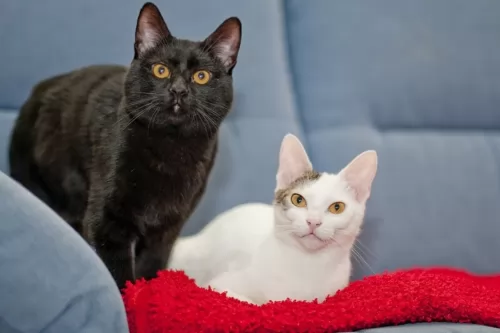 Just like you prepare for a human baby’s arrival, prepare for your Domestic Shorthaired’ arrival.
Just like you prepare for a human baby’s arrival, prepare for your Domestic Shorthaired’ arrival.
Have food and water bowls, a nice, dry, warm bed, toys to stimulate mind and body, litter box, scratching post, climbing tree and collar.
Have your cat neutered or spayed. This is to avoid unwanted kittens. You’ll often see these cats in animal shelters and you don’t want to add to the burden of these shelters. By neutering and spaying your cat, they behave in a better way. They are far less likely to want to roam away from home as well. A cat that have been neutered or spayed also enjoys a host of health benefits, and this common surgical operation is highly recommended.
Food for your cat is very important for good health. Do research and you’ll discover how imperative good gut-health is. A poor diet and the wrong diet can cause your cat to battle with a lot of poor health issues and digestive problems.
You’ll end up spending a fortune on your cat’s vet bills. A cat is a carnivore and it is most important to feed your cat meat. Check out the labels on the cat’s commercially manufactured food and choose the ones that make meat a top ingredient.
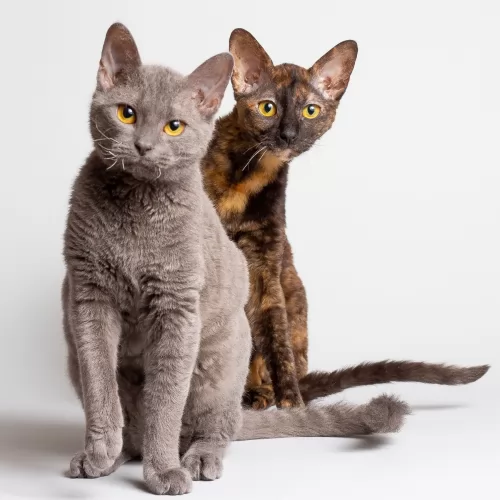 The German Rex is a shorthaired breed so a gentle brush once a week will be quite adequate.
The German Rex is a shorthaired breed so a gentle brush once a week will be quite adequate.
As you groom your German Rex, feel for any unusual lumps and make sure there are no signs of sores or rashes on your cat.
Check inside his ears for wax and dirt buildup and signs of redness for infection. If you don’t like to clean the inside of your cat’s ears, there are professional cat groomers and your local vet who will do this for you.
Make sure you feed your Rex the best cat food there is. When you look at the commercially cat manufactured foods there are, you’ll notice that there is dry kibble for cats as well as wet-type foods.
Through trial and error, you’ll learn what your cat likes, but your vet can offer valuable information on what is essential in a cat’s diet. Cats are carnivores so that means their diets have to be high in meat – protein – and low in carbohydrates.
Check out the best cat foods there are – the ones that have all the vitamins and minerals your cat requires to remain healthy.
Provide your cat with a litter box and keep it meticulously clean, scooping out the cat droppings every day and changing the actual sand or grit regularly.
Provide your cat with a warm bed, food and water bowls, toys, collar, and tag, climbing tree and scratching post.
Your kitten must start their first vaccines between 8 and 12 weeks of age. Your kitten will also be dewormed.
Take your cat to the vet when he is sick.